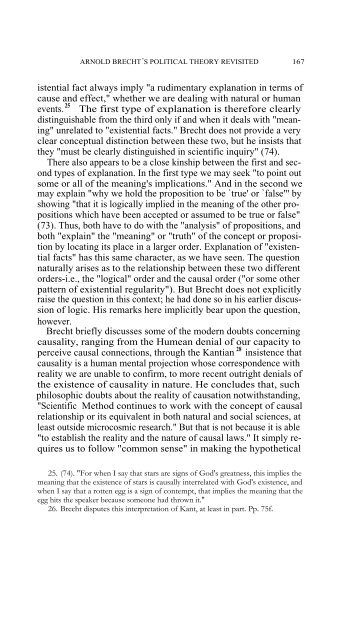ARNOLD BRECHT'S POLITICAL THEORY REVISITED Political ...
ARNOLD BRECHT'S POLITICAL THEORY REVISITED Political ...
ARNOLD BRECHT'S POLITICAL THEORY REVISITED Political ...
Create successful ePaper yourself
Turn your PDF publications into a flip-book with our unique Google optimized e-Paper software.
<strong>ARNOLD</strong> BRECHT ' S <strong>POLITICAL</strong> <strong>THEORY</strong> <strong>REVISITED</strong> 167<br />
istential fact always imply "a rudimentary explanation in terms of<br />
cause and effect," whether we are dealing with natural or human<br />
events. 25 The first type of explanation is therefore clearly<br />
distinguishable from the third only if and when it deals with "meaning"<br />
unrelated to "existential facts." Brecht does not provide a very<br />
clear conceptual distinction between these two, but he insists that<br />
they "must be clearly distinguished in scientific inquiry" (74).<br />
There also appears to be a close kinship between the first and second<br />
types of explanation. In the first type we may seek "to point out<br />
some or all of the meaning's implications." And in the second we<br />
may explain "why we hold the proposition to be `true' or `false"' by<br />
showing "that it is logically implied in the meaning of the other propositions<br />
which have been accepted or assumed to be true or false"<br />
(73). Thus, both have to do with the "analysis" of propositions, and<br />
both "explain" the "meaning" or "truth" of the concept or proposition<br />
by locating its place in a larger order. Explanation of "existential<br />
facts" has this same character, as we have seen. The question<br />
naturally arises as to the relationship between these two different<br />
orders-i.e., the "logical" order and the causal order ("or some other<br />
pattern of existential regularity"). But Brecht does not explicitly<br />
raise the question in this context; he had done so in his earlier discussion<br />
of logic. His remarks here implicitly bear upon the question,<br />
however.<br />
Brecht briefly discusses some of the modern doubts concerning<br />
causality, ranging from the Humean denial of our capacity to<br />
perceive causal connections, through the Kantian 28 insistence that<br />
causality is a human mental projection whose correspondence with<br />
reality we are unable to confirm, to more recent outright denials of<br />
the existence of causality in nature. He concludes that, such<br />
philosophic doubts about the reality of causation notwithstanding,<br />
"Scientific Method continues to work with the concept of causal<br />
relationship or its equivalent in both natural and social sciences, at<br />
least outside microcosmic research." But that is not because it is able<br />
"to establish the reality and the nature of causal laws." It simply requires<br />
us to follow "common sense" in making the hypothetical<br />
25. (74). "For when I say that stars are signs of God's greatness, this implies the<br />
meaning that the existence of stars is causally interrelated with God's existence, and<br />
when I say that a rotten egg is a sign of contempt, that implies the meaning that the<br />
egg hits the speaker because someone had thrown it."<br />
26. Brecht disputes this interpretation of Kant, at least in part. Pp. 75f.
















